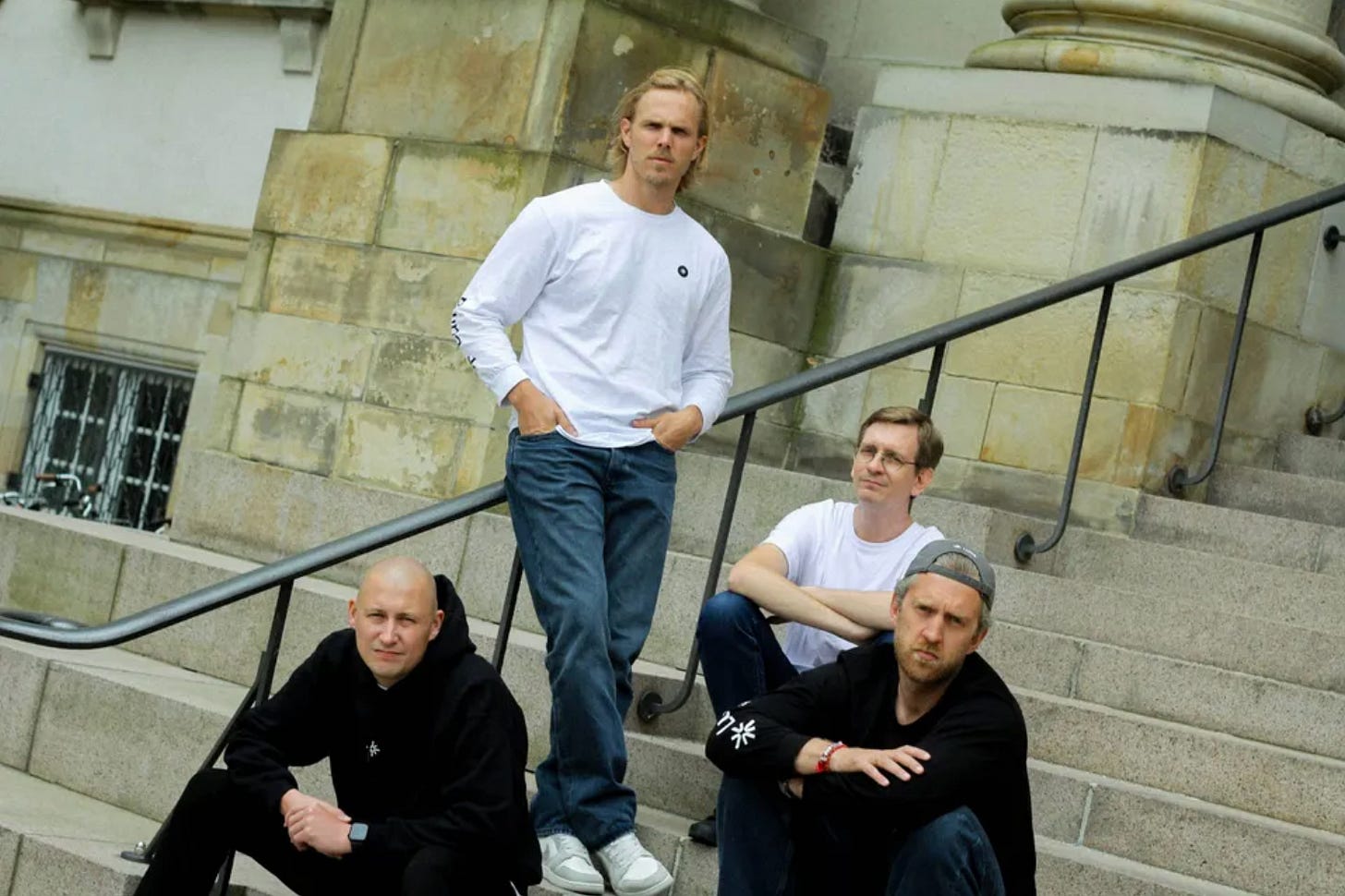Feeling the heat? Time to take the temperature of AI in legal
June was apparently the hottest month... ever
Newsletter #21
Incoming: Stories from the trenches
A word from the person behind the laptop
Welcome to my summer series!
I decided to spend some of my time this summer talking to people who actually operate in the AI legaltech space, and have experience getting their hands dirty in one way or another.
Meet Jerrit Jungman, Aleksi Hokkanen and Kristian Anker that I interviewed for the first chapter in this series
I've spoken to many interesting people with different perspectives that can hopefully give us a glimpse of what is coming in the AI legaltech space.
This first newsletter is about the different perspectives from builders, investors, and practitioners. How much do they have in common and where do they differ?
Hang tight!
Part 1: Builders
Building trust with Kristian Anker, Luma
My journey begins in the startup hub of Matrikel1 in central Copenhagen, home to the innovative legaltech startup Luma. Having followed their journey closely, I believed they were the perfect entry point for a deep dive into the AI legaltech landscape.
Kristian Anker and Oscar Almstrup, the founders of Luma, are childhood friends who've already experienced the thrill of building and selling a successful company together. Sitting down with Kristian, I wanted to understand their unique perspective on AI and legaltech.
Startup lawyer
Kristian's story is unconventional. Originally on track to become a lawyer, he took a detour, joining the army as an officer for a couple of years. Returning to his studies, he discovered entrepreneurship almost by accident, inspired during a visit to Oscar, who was studying in San Francisco.
They quickly built a prototype that took them to a Hong Kong conference, validating their idea and eventually evolving it into LegalHero, a platform connecting gig-based lawyers to clients. After a successful exit to Lexly, Kristian became the CTPO of the acquiring company, before founding Luma with Oscar once again.
When asked what sets Luma apart, Kristian explains: “Our angle is tying together the entire back office, legal, HR, and Finance, from a legal ops perspective. Most companies prefer a finance-centric view, but we've flipped that, simplifying and commoditizing legal operations specifically for SMEs.”
He recalls the exact moment he realised something had changed: “Seeing the first versions of the new LLMs felt like a turning point. Suddenly, we could enable non-legal professionals to manage legal operations intuitively, without needing endless workflows and manual processes. It was as if someone had invented a completely new joystick.”
Having built LegalHero before the GPT era and now Luma post-GPT, Kristian identifies pace and accessibility as the biggest tech shift. "Past technological advances typically benefited large corporations first.
But with ChatGPT, AI went directly to consumers, instantly accessible through the simplest of interfaces: A chat. This consumer-first approach has dramatically accelerated adoption and development speeds."
A hot space
Kristian believes the AI legaltech space has never been hotter: "Earlier AI solutions felt academic, with limited real-world impact. Now, we're seeing applications that genuinely transform workflows.
Companies like Harvey and Legora show the rapid adoption and significant investment pouring into the field, but the real test will be seeing their staying power over time."
When pressed about what makes AI different from past expert systems, Kristian emphasizes its timing and suitability for legal work: “AI models today are text-driven and deeply aligned with legal tasks.
Combined with the rapid growth of AI agents, it's an ideal match. Trust remains central, but AI's direct-to-consumer approach bypassed typical adoption hurdles, making lawyers quicker to adopt and integrate these tools."
Trust issues
However, the challenge of trust remains the hardest objection Kristian encounters: “How can I trust it?”. It’s the one question every founder in this space has to have a good answer for. Not for sales, but because it’s the only question that matters.
As for the trend he's betting on, Kristian doesn't hesitate: “Delivering AI-powered legal services directly to customers rather than just selling systems to lawyers. With proper guardrails and human oversight, AI can replace significant portions of routine as well as core legal work for SMEs"
He concludes confidently: "AI will never replace a lawyer who can sell trust better than AI can, because, ultimately, AI will become just another software tool."
Part 2: The Investors
Inside the VC perspective with Jerrit Jungman
I continue my journey by turning to venture capitalists, who often provide essential fuel for innovation.
Eager to understand the enthusiasm behind recent valuations of promising legaltech startups like Legora and Harvey, I reached out to Jerrit Jungman from People Ventures to gain insight into what investors find compelling in the AI legaltech space.
Jerrit's story is straightforward: growing up in Germany, studying business, and getting hands-on startup experience before crossing over to the investment side. For the past three years, he's been part of People Ventures, a Nordic venture capital firm.
“We support founders across Northern Europe, from idea stage to Series A, typically investing up to €2.5 million,” Jerrit explains. “Legal interests us because it’s filled with broken processes, perfectly positioned as prime use-cases for language models.”
Digitized Scandi landscape
On the hype level in Scandinavia, Jerrit is clear: "We are at the forefront of what’s happening. Multiple companies that are doing breakout things. I believe we have a natural advantage up here, given the superior digitalization compared to other countries"
When discussing valuations like those of Harvey and Legora, Jerrit acknowledges the hype but stresses there's substance behind it: "Without direct access to internal data, it's tough to judge, but both companies must have best-in-class growth rates. Harvey, for example, grew monthly active users (MAU) by 240% year-over-year, with over 70% MAU among paid seats. The potential of this space is definitely also priced in."
However, Jerrit doesn't ignore practical challenges, noting churn as a significant issue: "Churn in legaltech closely ties to change management. Lawyers don't have much time for new systems, so onboarding and training are critical. Both startups and buyers must have clear plans for user education."
Investment focus
I address the fundamental paradox that the legal industry is built on trust and LLMs have a potential trust challenge. He draws a parallel with medicine: "Every transformative technology starts imperfectly. AI in medicine already surpasses human accuracy in diagnostics. Law will inevitably follow, making it potentially unethical not to adopt AI when outcomes demonstrably improve.“
He continues “Our investment thesis revolves around data: high-quality, domain-specific data is key to reducing errors and building reliable AI."
Finally, I prompt Jerrit to finish the thought, “AI will never replace a lawyer who can____"
“…set aside their ego and embrace technological change. You’re not competing with AI, you’re competing with other lawyers and firms who are using it effectively.”
He elaborates “This isn’t unique to the legal profession; it’s true in my field and many others. I see it as a real opportunity to leap ahead of the competition and make a name for yourself by leveraging the best tools available early.”
Part 3: The Practitioner
A realists perspective from Aleksi Hokkanen at Plugsurfing
To find out where we are in the hype cycle I also wanted to talk to someone who works “where the rubber hits the road”.
I reached out to Aleksi Hokkanen, a legal counsel from Plugsurfing in Helsinki, whose thoughtful insights about integrating AI into the legal function in companies caught my attention. Some of his perspectives intrigued me, and I was eager to learn more about his experience with potential vendors, solutions, and his own workflows.
“It’s a bubble. It’s like internet companies in 1999.”
I catch him on the phone in his car while he’s charging somewhere along the highways in Finland.
“Listen, the market is too crowded, it’s overhyped and there’s so much buzz especially from VCs, and I’m actually very positive about the implementation of AI as a tool in the legal toolbox”
The ideal customer is still sceptic
Plugsurfing is a tech-driven company connecting drivers, fleets, and carmakers to one of Europe’s largest EV charging networks.
He’s part of a legal team operating across Europe in the EV charging and software B2B spaces. This is in other words the kind of tech oriented legal team that could be first movers in the AI space.
Aleksi’s pragmatic about AI both its potential and its pitfalls. When asked about measuring return on investment for AI solutions, he’s clear-eyed: “Right now, it’s complicated. Most senior management judges legal efficiency purely through cost. They’re comfortable with the idea that legal teams are overloaded. So, even if AI boosts efficiency, that improvement isn’t always clearly visible on balance sheets.”
Hokkanen explains that while many vendors promise significant enhancements, real-world implementation often hits snags. Plus budget-holders in companies might belong to an older generation who prefer familiar Microsoft tools and are cautious about new technologies. “People are still wrapping their heads around what AI means in practical terms. You’re often met with “Just use co-pilot”” Hokkanen says.
He continues “On the other hand you can’t just plug AI in and expect magic. It’s a tool, and you have to invest time and money ensuring models don’t hallucinate. Trust requires human oversight.”
He’s optimistic about AI’s transformative potential but stresses it won’t replace core legal skills. “AI will never replace a lawyer who can ask thoughtful questions, apply judgment, and truly understand the human context. But lawyers who learn to leverage AI will outperform those who don’t.”
Expensive ChatGPT wrappers?
When it comes to choosing specific AI solutions, Hokkanen mentions platforms like Legora, the Swedish legaltech company, though he finds the pricing models challenging. “Why pay for something that expensive when ChatGPT is already delivering similar outputs? It really has to integrate well with existing workflows to be worth the price tag”.
Aleksi highlights that AI adoption is in its infancy: “Most companies are barely scratching the surface. AI has only been mainstream for a few months. Right now, it’s a nice-to-have, not yet essential.”
He also addresses challenges in integration, noting a disconnect between the sales pitches of AI vendors and actual user experience: “There’s a gap between what’s being sold and what’s truly practical. Contracts can’t just be handed to an AI model and returned ready-to-sign. The same goes for other legal tasks. You still need careful human review.”
He sees current excitement around AI, but his bubble thesis comes from tendencies similar to the dot-com boom and bust: “Most of these legal-tech AI startups won’t survive. But the ones that do, those will genuinely improve how we work. Like internet companies after 1999”
As our call wraps up, he returns to his car charging somewhere in Finland, blending his legal expertise with a dose of realism about the road ahead for AI in legal tech.
Navigating the road ahead
Where does that leave us?
Talking to people with actual experience in this field leaves me with this impression: We can all agree that the train is moving fast right now, but it’s hard to say which destination we’re headed towards.
Is it a looming revolution, just another set in the toolbox or will LLMs ever overcome the fundamental trust challenge? I’m generally optimistic about the future of AI in law, but based on my own experience, there’s still a noticeable gap between the practical realities of legal workflows and how LLMs are implemented today.
With a builder’s mindset, strategic VC support, and careful attention to the trust challenge, we might just bridge that gap sooner than we think.
I’ll continue my summer journey to try and find the answer…
Stay tuned!





